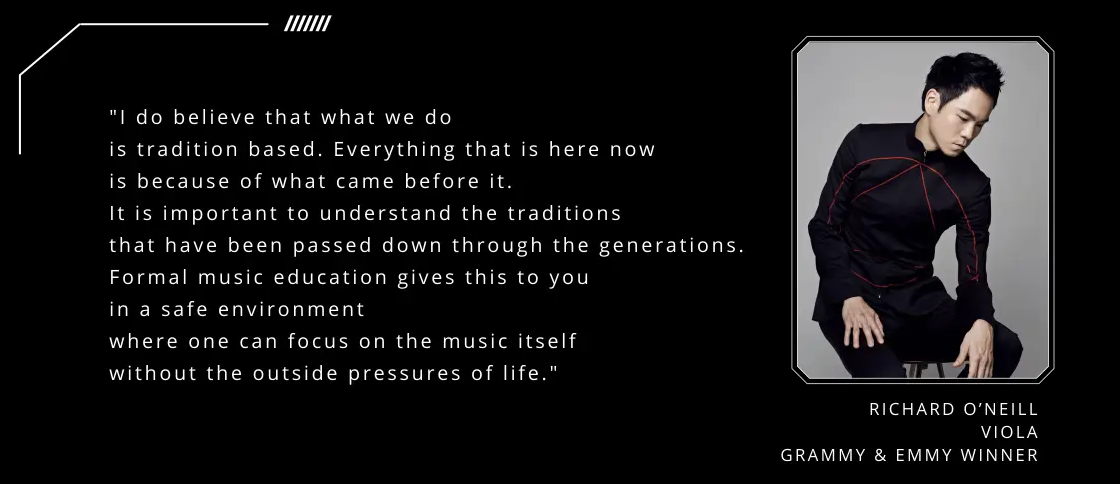Richard O’Neill on Music, Mentorship, and RONDO Strings

At StringOvation, we believe every artist’s journey begins with inspiration, passion, and a foundation in music education. That is why we bring you exclusive conversations with musicians whose stories illuminate not only their artistry but also the mentors, teachers, and pivotal moments that shaped their path.
Today we are proud to feature Richard O’Neill, Grammy and Emmy Award–winning violist and a dedicated Thomastik-Infeld artist. In this interview, Richard shares how his beginnings, formal training, and lifelong commitment to learning have shaped his artistry.
INTRODUCING RICHARD O'NEILL - VIOLA - GRAMMY AND EMMY WINNER
Early Musical Beginnings
Can you tell us about your musical background and how you first got started in music?
I come from a non musical family, no one was involved in music … I was raised by my
grandparents and mother, and our family had an extensive record collection. Growing up in the Pacific Northwest with the short days in the winter, I spent many hours listening to music by myself. I started violin lessons at five and began viola at 15.
Formal Education and Training
What was your formal music education path like? Did you attend a music school or conservatory?
At age 15 I decided to take a leap and enrolled in a resident high school boarding program at the University of North Carolina School of the Arts, which was a great way to get an early start in conservatory style training. I went onto undergraduate studies at the University of Southern California and then graduate work at the Juilliard School.
How did your music education shape your style and approach to music?
I always had a lot of enthusiasm and passion for music. My formal education helped to give me the tools and discipline to be able to make my playing much more consistent and solid, especially under pressure.
What kind of musical training have you received (e.g. instrumental lessons, music theory classes)?
I think I received a pretty standard, US musical education, with a strong foundation in technique through scales, arpeggios and etudes with a systematic progression through repertoire, as well as excellent ear training, theory and music history at NCSA and Juilliard. One additional thing I did on my own was score study, which was result of a childhood obsession with Wagner’s Der Ring des Nibelungen … thankfully I had access to those Dover Study scores … I have had some conducting training, but my passion and love for chamber has always been at the center of my education.
The Influence of Teachers and Mentors
Did you have any influential teachers or mentors along the way? How did they impact your musical development?
My teachers made ALL the difference. Donald McInnes had a systematic way of getting all of his students ready to perform as a soloist. Karen Tuttle had a way of getting me to understand and listen to my body more, identify tension, and how to use the joints of the body to ones advantage. Paul Neubauer taught me the importance of making your playing as relaxed and easy as possible, his playing itself a model of the greatest viola playing I have witnessed.
The Role of Music Education
How important do you think formal music education is for aspiring musicians?
There are many paths towards a life in music. I do believe that what we do is tradition based, everything that is here now is because of what came before it … therefore it is important to understand the traditions that have been passed down through the generations. Formal education gives this to you in a safe environment where one can focus on the music itself without the outside pressures of life.
Lifelong Growth as a Musician
In what ways do you continue to further your musical education and skills today?
Everyday is a new day. I try not to rest on whatever happened before but try to be mindful of all the habits in my playing. Good and bad habits come about similarly, and it is necessary to constantly question ones playing in the effort to always try to get incrementally better.
Advice for Aspiring Musicians
What advice would you give to young musicians who are considering pursuing a formal music education path?
Long loop systems, like learning an instrument, are so valuable. The easy way, the quick
solution, instant understanding has its value in society, but for long lasting things, sometimes the hard won successes are the best. Humans still learn according to Hebbian plasticity, the more we work our brains, the greater depth of understanding and command we gather.
Richard O’Neill and RONDO Strings
What strings do you use today and why?
Of course Thomastik-Infeld! I used RONDOs, on all strings. They are the best for me. They have warmth, complexity, depth, flexibility, quick response and durability. I haven’t broken a string on stage yet using my RONDOs!
Explore the Sound of RONDO Strings
Richard O’Neill’s passion and artistry are powered by Thomastik-Infeld RONDO strings, celebrated for their warmth, complexity, and durability.
Discover RONDO strings for viola, violin, and cello
Join the free StringOvation program for exclusive perks, classroom tools, and seasonal savings — made for teachers and performers alike.
